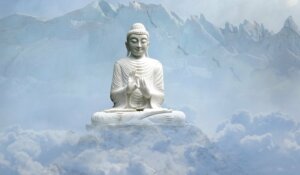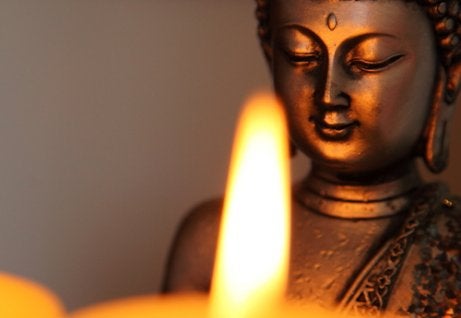Buddhist Laws For Karmic Cleansing

The concept of karma is one of the most beautiful elements of Buddhism. Whether or not you agree with this philosophy, it’s an interesting way of framing your life. A slightly less familiar concept of Buddhism is karmic cleansing. In today’s article, we’ll share some of the beautiful lessons that stem from this idea.
Buddhists teach that karmic cleansing involves actions and attitudes that compensate for mistakes you’ve made in the past. In other words, paying off the symbolic debt that you’ve accumulated over the years.
According to this philosophy, karma manifests itself as negative causation. Far from being random, however, everything is the effect of your prior actions. The effect of karmic cleansing is to free you from the consequences of difficult past experiences and situations. Twelve laws govern karmic cleansing, and we’ll share them with you today.
The basic laws and how to cleanse your karma
The “golden rule” of karma says, in a nutshell, that you reap what you sow. What happens, then, when you know that what you sowed wasn’t the best? The answer is simple. Try to make up for the damage you caused. That’s how you clean your karma.

Creativity
Each individual has their own way of seeing the world and that determines what experiences they have. Knowing that, try to shape your perspective in a constructive way.
Choose to see the good in people and experiences so that your actions will lean toward the good as well.
Humility is part of karmic cleansing
Nothing belongs to you. You never truly own the objects and goods that you acquire, much less the people or living things in your life.
If you understand that and act accordingly, you’ll be able to face the inevitable loss or separation with grace.
Responsibility
The law of responsibility calls you never to blame anyone or anything for the negative things that happen to you. If something bad happens, take responsibility for it.
Reflect on your mistakes instead of looking for someone else to blame. The more responsible you are, the less karmic force you’ll have in your life.
Connection
The law of connection says that there’s a link between everything that exists in this universe. To clean your karma, you have to be aware that every single word and action has repercussions for you and other people.
Keep this in mind when you’re tempted to give your opinion about things that don’t really concern you. If you don’t have enough information about something, it isn’t your place to speak.
Development
All change is a form of growth, and everything is constantly changing. Think of these transformations as blessings that make it possible for you to evolve.
The less you resist these changes, the less karma you’ll have in your life.
Focalization
When you understand that you can achieve any goal by prioritizing your actions in the present instead of anticipating the future, you’ll reach a state of karmic harmony.
Focus on the future and do what’s required of you in the here and now. Don’t abandon or undervalue your small daily achievements.
Generosity
You get what you give. It isn’t about quantity but about quality. On the other hand, giving a lot doesn’t mean you’ll get the same back (or more).
In other words, your reward for giving is the satisfaction you get from the act of giving. This is the variable that usually reinforces the generosity of exchanges.
The present
The law of the present invites you to see the present moment as the most important, the most valuable. Live every moment as best as you can.
The most valuable thing in your life is in front of you, right now. That’s a hard concept to process, given the structure of our lives today. But everything that isn’t in front of you is an illusion.

Change
The law of change states that, when you make the same decisions and behave the same way, your reality won’t change.
If you want to change, you have to change your actions and decisions. If you’re trying to get somewhere else, don’t take the same path.
Patience
The law of patience teaches us that everything has a process, and those processes take time. Respecting that everything has its own pace is part of karmic cleansing. Patience means trusting that everything will happen in its own time.
Inspiration
The law of inspiration calls you to fully commit to what you love and what you want to achieve. Your body, mind, and spirit have to work together towards your goals. Don’t save your energy. Instead, do everything you can to make it happen.
Buddhists believe that if you respect the laws of karma, you’ll be free. No one can completely avoid mistakes. However, if you set yourself on the path of evolution, your mistakes become a source of growth. Karmic cleansing means coming back to your center.
All cited sources were thoroughly reviewed by our team to ensure their quality, reliability, currency, and validity. The bibliography of this article was considered reliable and of academic or scientific accuracy.
- Steiner, R. (2007). Las manifestaciones del Karma. Editorial Kier.
This text is provided for informational purposes only and does not replace consultation with a professional. If in doubt, consult your specialist.








